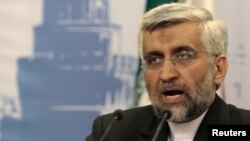MOSCOW - World powers believe that Iran is enriching uranium to make a nuclear bomb. To avoid a military confrontation, economic sanctions and diplomatic talks are the tools of the moment. But the latest talks with Iran produced little progress.
Two days of tough talks over Iran's nuclear program ended Tuesday in Moscow without a date set for a new round.
Negotiations between world powers and Iran have been held monthly since April in hopes of keeping Iran from building a nuclear bomb.
This time even heavy pressure by Russia, the host nation, failed to get the Iranians to agree to stop enriching uranium.
In two weeks, a nuclear experts meeting will be held in Istanbul, according to Catherine Ashton, the lead negotiator for Germany and the five permanent members of the United Nations Security Council, the United States, Britain, France, China, and Russia.
"We set out our respective positions in what were detailed, tough and frank exchanges. After five plenary sessions and several bilateral meeting we have begun to tackle critical issues. However, it remains clear that there are significant gaps between the substance of the two positions," she said.
Iranian's chief negotiator, Saeed Jalili, said he hoped a date would be set for another political meeting. But he clung to Tehran's position that Iran has the right to enrich uranium. He said that Iran needs highly enriched uranium for medical and energy needs, not for making a bomb.
But the world powers also stuck to their basic demands. They want Tehran to stop enriching uranium to levels that approach weapons grade. They want Iran to ship out of the country all highly enriched uranium. They want Iran to close an underground enrichment facility, Fordow, and to allow inspections by United Nations nuclear monitors.
The technical meeting will be July 3, two days after European Union sanctions against Iran come into effect. These sanctions, combined with existing U.S. sanctions, are expected to reduce Iran's oil exports to a fraction of last year's levels.
After the talks ended here, a senior American officials briefed reporters. The official said of the Iran talks: "We are not going to get trapped in a process that we do not think is a productive one.
The sanctions will be increasing. We have told the Iranians there will be more pressure coming."
The American official and Ashton, the lead European Union negotiator, stressed in press briefings that the world powers are united in opposition to Iran acquiring a bomb.
On Monday, U.S. President Barrack Obama and Russian President Vladimir Putin met in Mexico and issued a joint statement on the issue: "We agree that Iran must undertake serious efforts aimed at restoring international confidence in the exclusively peaceful nature of its nuclear program."
Ashton said, "The choice is Iran's. We expect Iran to decide whether it is willing to make diplomacy work."
Oil sales account for 90 percent of Iran's export revenue. Now, some analysts believe, Iran's leadership may in a race to enrich uranium enough for a bomb - before the economy collapses.




